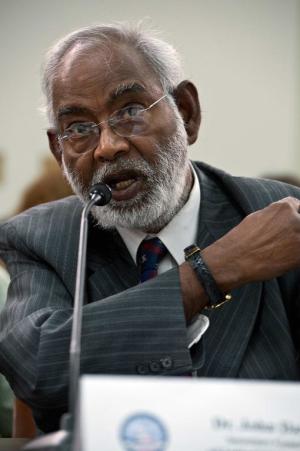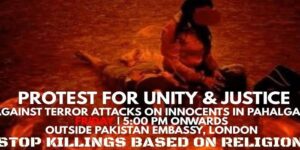Washington (AFP) – Several US lawmakers voiced concern Friday for the future of religious minorities in India in a hearing critics denounced as an attempt to influence upcoming elections.
With polls starting Monday in the world’s largest democracy, several activists testifying before the US Congress’ human rights commission expressed fear for the treatment of Muslims and Christians if Hindu nationalist Narendra Modi becomes the next prime minister, as surveys predict.
Representative Joe Pitts, a Republican and conservative Christian, said India had a “climate of impunity” for perpetrators of violence against minorities and criticized laws against religious conversion.
“Clearly all of Indian society is being affected by an indisputable rise in religious intolerance at the very least and religious violence at the very worst,” Pitts said.
Representative Keith Ellison, a left-leaning Democrat who is Muslim, said that he supported strong US relations with India and did not believe that the US record was faultless. But he voiced alarm over what he said was continued polarization in the western state of Gujarat, which is led by Modi, since 2002 riots in which more than 1,000 people — mostly Muslims — were hacked, burned or shot to death.
Critics say Modi turned a blind eye or worse to attacks on Muslims, although he denies wrongdoing and investigations have cleared him of personal responsibility. Representative Tulsi Gabbard, a Democrat who is the first Hindu elected to the US Congress, criticized the timing of the hearing and said it could be used either to foment sectarian strife or to provide campaign ammunition for Modi’s opponents.
“I feel that the goal of this hearing ultimately is to influence the outcome of this election, which is something that I don’t feel is appropriate for us here in the United States Congress to do,” Gabbard said.
India is majority Hindu but secular and has historically been a safe haven for religious groups including Tibetan Buddhists, Jews and Zoroastrians.

The Indian government often expresses indignation at perceived foreign interference in its domestic affairs, although the Indian embassy did not return a message Friday seeking comment.
The United States has been seeking a warmer relationship with India and has generally avoided criticism on sensitive religious issues, but in 2005 it denied a visa to Modi on human rights grounds.
In February, however, US ambassador to India Nancy Powell met Modi, a sign the US stance was softening towards the controversial politician. President Barack Obama’s administration did not send a representative to Friday’s hearing, which was sparsely attended.
John Dayal, an Indian Christian writer and activist, charged that a Hindu nationalist Indian government would target minorities by scrapping affirmative action plans and encouraging forcible conversions of Christians. Dayal, who said he has received threats accusing him of treason for testifying before the commission, called for the United States to include human rights and religious freedom in talks with India, much as Washington does with China.
Katrina Lantos Swett, the vice chair of the US Commission on International Religious Freedom which has long been critical of Modi, voiced concern that his Bharatiya Janata Party would promote policies that portray non-Hindus as foreigners.
“Many religious minority communities fear religious freedom will be jeopardized if the BJP wins and… Modi becomes prime minister. We hope that is not the case,” she said.
































